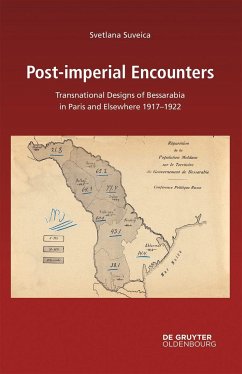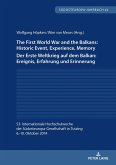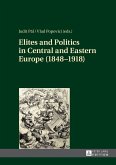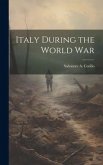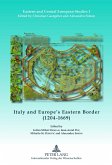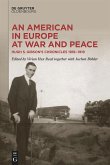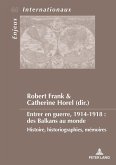In the former Russian province of Bessarabia united with Romania in 1918, local inhabitants tried to make sense of the new reality by mastering geopolitical visions and making their own identity choices. Profoundly marked by the World War I, the disintegration of the Russian Empire and the growing Bolshevik danger, a group of Bessarabians, of both imperial and revolutionary elite, refused to imagine the fate of their region alongside Romania but looked for political alternatives, either in autonomy inside Romania and Ukraine or as part of a restored (monarchic or democratic) Russia. The book tells the story of a transnational network of Bessarabians and White Russian émigrés in Paris and other European capitals who during the 1919 Peace Conference played wisely on the "Wilsonian moment" to propel the idea of a pro-Russian "will" of the Bessarabians. Though unsuccessful in solving the Bessarabian "question" in Paris in their favor, they succeeded in animating anti-Romanian feelings and impacting personal and group identities inside the region.
Hinweis: Dieser Artikel kann nur an eine deutsche Lieferadresse ausgeliefert werden.
Hinweis: Dieser Artikel kann nur an eine deutsche Lieferadresse ausgeliefert werden.
Winner of the 2023 Society for Romanian Studies biennial book prize!
The Book Prize Committee - Camelia Craciun, Raluca Grosescu, and Cristian Cercel (chair) - agreed unanimously to award the prize to Svetlana Suveica for her Post-Imperial Encounters: Transnational Designs of Bessarabia in Paris and Elsewhere 1917-1922 (De Gruyter Oldenbourg, 2022). Suveica's impressive monograph brings up new perspectives on the incorporation of Bessarabia to Romania at the end of the First World War, decidedly moving away from teleological accounts centred on the nationalist ideology underlying narratives about the formation of Greater Romania. Drawing on a meticulous research in archives in nine countries, Suveica brings to the fore previously unexplored stances and positions with respect to Bessarabia's future in the context of the demise of the Russian Empire. The scope of the theoretical apparatus she employs is as broad as her engagement with primary and secondary sources in five languages. Post-Imperial Encounters does a great job in showing the contingent and situational character of belonging and of identities of ethnopolitical actors, in relationship with political processes unfolding in a time of radical uncertainty. In dealing at length with Russian and Bessarabian émigrés, Suveica implicitly invites the field of Romanian Studies to expand its own area of interest towards an engagement with previously neglected actors.
"Overall, this is a very important book for understanding the aftermath of World War One in the borderlands of the tsarist empire, the contestation of
borders and the history of the Russian-speaking minorities and their role in the Russian imperial narrative. Suveica provides a well-documented and
convincing study about the links between the regional Russian-Bessarabian elites and post-World War One nostalgia for the Russian empire, as well as the attempts to restore it or find alternative plans for the region." Stefan Cristian Ionescu in: Slavonic and East European Review, April 2024
The Book Prize Committee - Camelia Craciun, Raluca Grosescu, and Cristian Cercel (chair) - agreed unanimously to award the prize to Svetlana Suveica for her Post-Imperial Encounters: Transnational Designs of Bessarabia in Paris and Elsewhere 1917-1922 (De Gruyter Oldenbourg, 2022). Suveica's impressive monograph brings up new perspectives on the incorporation of Bessarabia to Romania at the end of the First World War, decidedly moving away from teleological accounts centred on the nationalist ideology underlying narratives about the formation of Greater Romania. Drawing on a meticulous research in archives in nine countries, Suveica brings to the fore previously unexplored stances and positions with respect to Bessarabia's future in the context of the demise of the Russian Empire. The scope of the theoretical apparatus she employs is as broad as her engagement with primary and secondary sources in five languages. Post-Imperial Encounters does a great job in showing the contingent and situational character of belonging and of identities of ethnopolitical actors, in relationship with political processes unfolding in a time of radical uncertainty. In dealing at length with Russian and Bessarabian émigrés, Suveica implicitly invites the field of Romanian Studies to expand its own area of interest towards an engagement with previously neglected actors.
"Overall, this is a very important book for understanding the aftermath of World War One in the borderlands of the tsarist empire, the contestation of
borders and the history of the Russian-speaking minorities and their role in the Russian imperial narrative. Suveica provides a well-documented and
convincing study about the links between the regional Russian-Bessarabian elites and post-World War One nostalgia for the Russian empire, as well as the attempts to restore it or find alternative plans for the region." Stefan Cristian Ionescu in: Slavonic and East European Review, April 2024
Winner of the 2023 Society for Romanian Studies biennial book prize!
The Book Prize Committee - Camelia Craciun, Raluca Grosescu, and Cristian Cercel (chair) - agreed unanimously to award the prize to Svetlana Suveica for her Post-Imperial Encounters: Transnational Designs of Bessarabia in Paris and Elsewhere 1917-1922 (De Gruyter Oldenbourg, 2022). Suveica's impressive monograph brings up new perspectives on the incorporation of Bessarabia to Romania at the end of the First World War, decidedly moving away from teleological accounts centred on the nationalist ideology underlying narratives about the formation of Greater Romania. Drawing on a meticulous research in archives in nine countries, Suveica brings to the fore previously unexplored stances and positions with respect to Bessarabia's future in the context of the demise of the Russian Empire. The scope of the theoretical apparatus she employs is as broad as her engagement with primary and secondary sources in five languages. Post-Imperial Encounters does a great job in showing the contingent and situational character of belonging and of identities of ethnopolitical actors, in relationship with political processes unfolding in a time of radical uncertainty. In dealing at length with Russian and Bessarabian émigrés, Suveica implicitly invites the field of Romanian Studies to expand its own area of interest towards an engagement with previously neglected actors.
"Overall, this is a very important book for understanding the aftermath of World War One in the borderlands of the tsarist empire, the contestation of
borders and the history of the Russian-speaking minorities and their role in the Russian imperial narrative. Suveica provides a well-documented and
convincing study about the links between the regional Russian-Bessarabian elites and post-World War One nostalgia for the Russian empire, as well as the attempts to restore it or find alternative plans for the region." Stefan Cristian Ionescu in: Slavonic and East European Review, April 2024
The Book Prize Committee - Camelia Craciun, Raluca Grosescu, and Cristian Cercel (chair) - agreed unanimously to award the prize to Svetlana Suveica for her Post-Imperial Encounters: Transnational Designs of Bessarabia in Paris and Elsewhere 1917-1922 (De Gruyter Oldenbourg, 2022). Suveica's impressive monograph brings up new perspectives on the incorporation of Bessarabia to Romania at the end of the First World War, decidedly moving away from teleological accounts centred on the nationalist ideology underlying narratives about the formation of Greater Romania. Drawing on a meticulous research in archives in nine countries, Suveica brings to the fore previously unexplored stances and positions with respect to Bessarabia's future in the context of the demise of the Russian Empire. The scope of the theoretical apparatus she employs is as broad as her engagement with primary and secondary sources in five languages. Post-Imperial Encounters does a great job in showing the contingent and situational character of belonging and of identities of ethnopolitical actors, in relationship with political processes unfolding in a time of radical uncertainty. In dealing at length with Russian and Bessarabian émigrés, Suveica implicitly invites the field of Romanian Studies to expand its own area of interest towards an engagement with previously neglected actors.
"Overall, this is a very important book for understanding the aftermath of World War One in the borderlands of the tsarist empire, the contestation of
borders and the history of the Russian-speaking minorities and their role in the Russian imperial narrative. Suveica provides a well-documented and
convincing study about the links between the regional Russian-Bessarabian elites and post-World War One nostalgia for the Russian empire, as well as the attempts to restore it or find alternative plans for the region." Stefan Cristian Ionescu in: Slavonic and East European Review, April 2024

